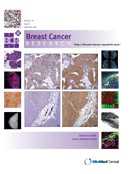母乳喂养可明显降低特定人群乳腺癌风险
2012-03-23 MedSci MedSci原创
长期以来,医学界一直支持母乳喂养,并称这不仅对婴儿有益,也有助于女性降低患乳腺癌的风险。一项新研究则进一步指出,这种效果对部分携带特定基因的女性来说尤其明显。 加拿大等国的研究人员近日在英国学术期刊《乳腺癌研究》Breast Cancer Research上发表的报告说,他们分析了数千名携带乳腺癌易感基因BRCA1和BCA2的女性。在BRCA1基因群体中,研究人员根据年龄、生活环境等方面
长期以来,医学界一直支持母乳喂养,并称这不仅对婴儿有益,也有助于女性降低患乳腺癌的风险。一项新研究则进一步指出,这种效果对部分携带特定基因的女性来说尤其明显。

加拿大等国的研究人员近日在英国学术期刊《乳腺癌研究》Breast Cancer Research上发表的报告说,他们分析了数千名携带乳腺癌易感基因BRCA1和BCA2的女性。在BRCA1基因群体中,研究人员根据年龄、生活环境等方面的相似程度将被研究女性分成1243对,每对女性的主要区别就是分娩后是否进行母乳喂养。
研究结果显示,在产后一年内坚持母乳喂养可使这一群体女性患乳腺癌的风险降低32%,如持续两年以上则效果更明显。但对于另外422对携带BRCA2基因的女性来说,母乳喂养并没有明显降低她们患乳腺癌的风险。
研究人员说,这两个基因引发乳腺癌的病理过程可能不同,其致病原因还需进一步研究。但可以看出,在降低乳腺癌风险方面,母乳喂养对特定人群效果更明显。
据介绍,过去的研究显示,对于整个女性群体来说,在孩子哺乳期内坚持母乳喂养,可使母亲患乳腺癌的风险平均每年降低4.3%。
Joanne Kotsopoulos, Jan Lubisnki, Leonardo Salmena, Henry T Lynch, Charmaine Kim-Sing, William D Foulkes, Parviz Ghadirian, Susan L Neuhausen, Rochelle Demsky, Nadine Tung, Peter Ainsworth, Leigha Senter, Andrea Eisen, Charis Eng, Christian Singer, Ophira Ginsburg, Joanne Blum, Tomasz Huzarski, Aletta Poll, Ping Sun, Steven A Narod and Hereditary Breast Cancer Clinical Study Group (hbcc)
Introduction Breastfeeding has been inversely related to breast cancer risk in the general population. Clarifying the role of breastfeeding among women with a BRCA1 or BRCA2 mutation may be helpful for risk assessment and for recommendations regarding prevention. We present an updated analysis of breastfeeding and risk of breast cancer using a large matched sample of BRCA mutation carriers. Methods We conducted a case-control study of 1,665 pairs of women with a deleterious mutation in either BRCA1 (n = 1,243 pairs) or BRCA2 (n = 422 pairs). Breast cancer cases and unaffected controls were matched on year of birth, mutation status, country of residence and parity. Information about reproductive factors, including breastfeeding for each live birth, was collected from a routinely administered questionnaire. Conditional logistic regression was used to estimate the association between ever having breastfed, as well as total duration of breastfeeding, and the risk of breast cancer. Results Among BRCA1 mutation carriers, breastfeeding for at least one year was associated with a 32% reduction in risk (OR = 0.68; 95%CI 0.52-0.91; P = 0.008); breastfeeding for two or more years conferred a greater reduction in risk (OR = 0.51; 95%CI 0.35-0.74). Among BRCA2 mutation carriers, there was no significant association between breastfeeding for at least one year and breast cancer risk (OR = 0.83; 95%CI 0.53-1.31; P = 0.43). Conclusions These data extend our previous findings that breastfeeding protects against BRCA1-, but not BRCA2-associated breast cancer. BRCA mutation carriers should be advised of the benefit of breastfeeding in terms of reducing breast cancer risk.
作者:MedSci
版权声明:
本网站所有注明“来源:梅斯医学”或“来源:MedSci原创”的文字、图片和音视频资料,版权均属于梅斯医学所有。非经授权,任何媒体、网站或个人不得转载,授权转载时须注明“来源:梅斯医学”。其它来源的文章系转载文章,本网所有转载文章系出于传递更多信息之目的,转载内容不代表本站立场。不希望被转载的媒体或个人可与我们联系,我们将立即进行删除处理。
在此留言





#乳腺癌风险#
32
#喂养#
25
#癌风险#
21
#母乳#
33